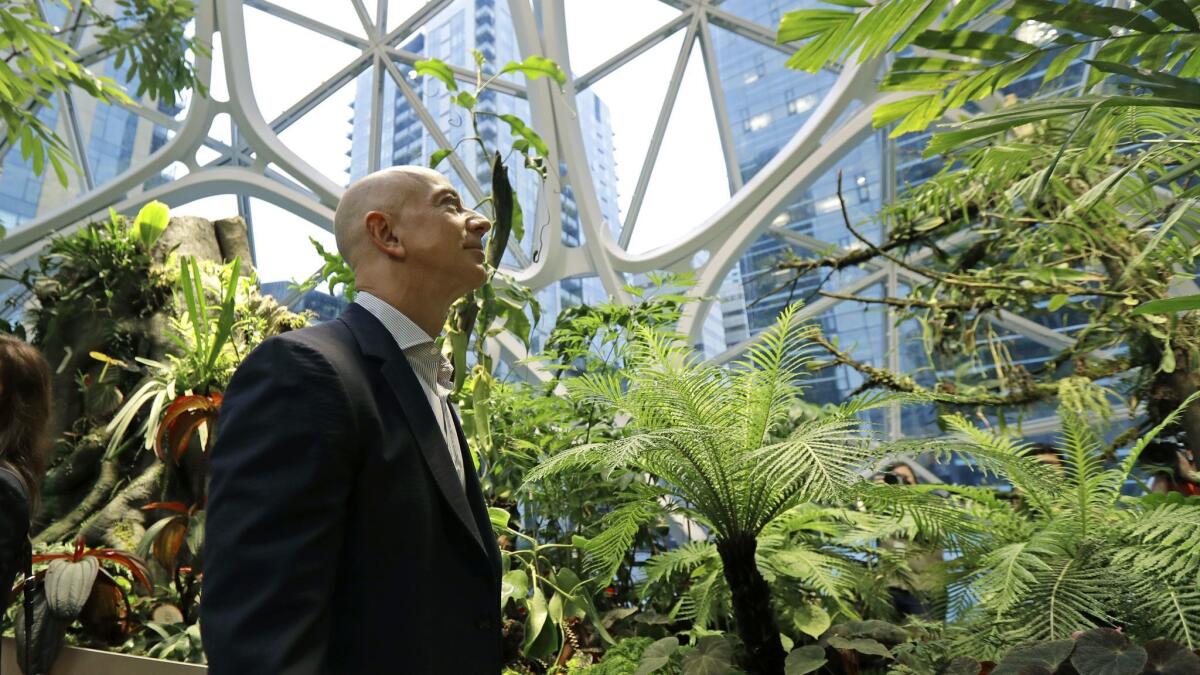Amazon moms are every working mom, calling for backup day-care benefits

- Share via
A group of working mothers at Amazon that calls itself the “Momazonians” is pressing the retail giant to provide a backup child-care benefit — asking for a perk that’s not only common among their tech peers but increasingly offered to employees including Starbucks baristas and Best Buy retail workers.
Even as backup child care is more commonly offered — giving workers access to subsidized care for those times when a nanny or child is sick, schools are closed or an emergency arises — it’s still rare, with surveys of large employers showing that 9% of companies offer it.
Employees, however, have become increasingly vocal about their benefits. And child care has emerged as a policy talking point in the 2020 presidential campaign. After several years of expanding parental leave programs, companies are catering to their bulging populations of millennials with the next logical family-friendly perk.
The Families and Work Institute’s 2017 National Survey of Employers, which includes a nationally representative group of employees, found that 5% of employers overall — a number that’s actually lower than it was in 2005 — and 9% of larger employers offered the benefit.
Providers of backup child care say they’ve seen an uptick in interest in the benefit in recent years. Care.com said its Care@Work program for employers is the fastest-growing division of its business. And Bright Horizons, the largest operator of employer-sponsored child-care centers, said it has seen a 70% increase in companies offering backup-care benefits over the last five years.
Bright Horizons Chief Executive Stephen Kramer credits a more vocal workforce that expects more from employers as well as a tight labor market where employers have to do more to distinguish themselves. But the fact that workers are having children at a later age has also played a role.
“The value of that missed day has increased over time,” Kramer said. When it was a 25-year-old recent graduate who was missing work because of a school closure, it didn’t have as much of an effect. “Now these people are in more senior roles, later in their career, and that’s much more valuable in terms of their time lost.”
Alyssa Johnson, senior director of account management at Care.com, said she thinks the expanded parental leave some companies have rolled out could prompt them to do more on the child-care front to avoid looking like their family-friendly benefits are shallow.
Meanwhile, she said, women — who are disproportionately providing care — are also speaking more openly about the problem and forcing the issue.
“What’s great about the Momazonians is they’re bringing attention to the real issues people are facing,” she said.
The more than 1,800 working moms at Amazon who form the Momazonian group want a benefit that typically costs employers anywhere from $10 to a few hundred dollars per employee, depending on how much it’s used and how the program is designed, Kramer said. They are reportedly expected to meet with senior management.
In an email, an Amazon spokeswoman declined to say how the company would respond to the group but said all Amazon full-time employees receive free membership to the Bright Horizons Care Advantage Program, which gives access to a network of caregivers, as well as discounts at day-care centers.
Other large tech companies have offered the benefit for years. Microsoft, which has offered subsidized backup child care for more than a decade, increased its benefit in 2019, offering employees 150 hours a year of backup subsidized child care and elder care, up from 100 hours. Facebook, Apple and Google also offer the benefit.
Others, meanwhile, think that while backup day care and other child-care benefits are likely to grow, an explosion isn’t likely.
Carol Sladek, who leads work-life consulting at Aon, said that as more millennials have children, employer interest in child-care programs will probably see an uptick.
“It’s entirely possible this could be the next parental leave,” she said.
More to Read
Inside the business of entertainment
The Wide Shot brings you news, analysis and insights on everything from streaming wars to production — and what it all means for the future.
You may occasionally receive promotional content from the Los Angeles Times.







